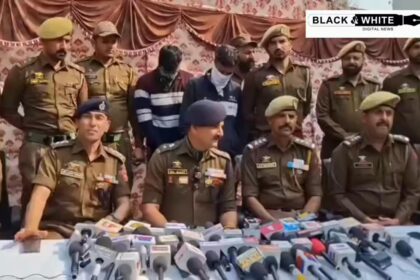||Black and White Digital News||
||Parvinder Singh, Editor In Chief :10 May||
**Synopsis:**
In a significant development, intelligence agencies have identified a group comprising former Pakistan army regulars and battle-hardened terrorists trained in both Pakistan and Afghanistan as the possible culprits behind the recent ambush on an Indian Air Force (IAF) convoy in Poonch. The attackers, armed with sophisticated US-made M4 carbines, are believed to have infiltrated the Rajouri and Poonch region, posing a new security challenge along the Line of Control (LoC).
Intelligence agencies have revealed startling details about the perpetrators of the recent attack on an Indian Air Force (IAF) convoy in Poonch, pointing towards a network of former Pakistan army regulars and battle-hardened terrorists armed with US-made M4 carbines. These individuals, adept in jungle warfare and trained extensively in Pakistan and Afghanistan, are suspected to have infiltrated the Rajouri and Poonch region, strategically targeting security forces along the Line of Control (LoC).
The attack, which occurred on May 4 in the Shahsitar area of Poonch, resulted in the tragic death of one personnel and left four others injured.
Sources indicate that the assailants utilized military-grade tactics, including firing on the convoy’s windshield to immobilize the vehicle before launching a sustained assault from multiple sides.
Among the suspects identified are Illiyas, also known as Fauji, a former Pakistan army regular, alongside two operatives affiliated with Lashkar-e-Taiba (LeT), named Abu Hamza and Hadun. This revelation underscores a concerning trend wherein retired Pakistani soldiers are allegedly collaborating with terrorist outfits to orchestrate attacks on Indian security forces.
The modus operandi of these infiltrators involves utilizing abandoned US military equipment, particularly M4 carbines left behind during the US withdrawal from Afghanistan.The use of such advanced weaponry signals an alarming development, highlighting the reach and sophistication of these armed groups.
Furthermore, it has been disclosed that over a dozen such terrorists have entered the region, operating in small groups to evade detection.
The ultras, trained for survival in forest environments and adept at eluding security forces post-attack, pose a significant threat to the stability and security of the region.
This latest incident sheds light on Pakistan’s evolving strategy, wherein retired army personnel are allegedly being recruited to bolster terrorist activities in Jammu and Kashmir.
Lt General Upendra Dwivedi, Vice-Chief of the Army Staff, had previously highlighted instances where slain terrorists were identified as former Pakistani army personnel, underscoring the gravity of this emerging threat.
Security forces are now intensifying efforts to counter this new challenge, deploying enhanced surveillance and intelligence-gathering measures to preempt future attacks. The use of US-supplied weaponry by these groups adds a layer of complexity to the ongoing security situation, necessitating a comprehensive and coordinated response from Indian authorities.
The infiltration of ex-military personnel into terrorist networks represents a dangerous escalation, requiring sustained vigilance and proactive measures to safeguard against future threats emanating from across the LoC.
Leave a comment
You Might Also Like
J&K team celebrates after lifting the Ranji Trophy, creating history
J&K team celebrates after lifting the Ranji Trophy, creating history
0 Min Read
Deputy CM Surinder choudhary Ne Kaha Jis Par Guzarti Hai Wo He Janta Hai Investigation Fair Honi Chahiye
Deputy CM Surinder choudhary Ne Kaha Jis Par Guzarti Hai Wo He Janta Hai Investigation Fair Honi Chahiye
0 Min Read
SP South Jammu addressing media today said Gandhi Nagar police has recovered 16 stolen bikes worth Rs 12 Lakh and arrested two accused. He said police has recovered 160 missing phones while 36 missing phones have already been handed over to their owners. SP said the total value of these phones is Rs 68 Lakhs
SP South Jammu addressing media today said Gandhi Nagar police has recovered 16 stolen bikes worth Rs 12 Lakh and…
0 Min Read
Kya PDP Future Me Come Back Kar Sakti Hai Ya Nhi Nc MLA Baramulla Javed Beig Ka Jawab Sunye
Kya PDP Future Me Come Back Kar Sakti Hai Ya Nhi Nc MLA Baramulla Javed Beig Ka Jawab Sunye
0 Min Read








